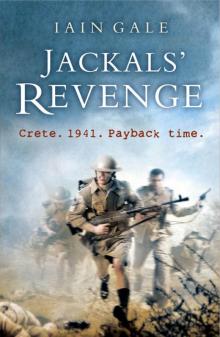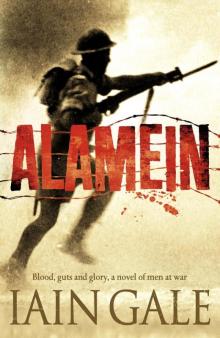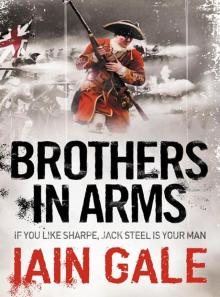Conspiracy Read online
Page 7
‘Of course, sir, it would be an honour, a real honour.’
Keane was aware that Marmont had been born into the minor French nobility. It was well known, and it had not occurred to him, when he had suggested Archer as his companion, that the two of them would be invited to dine with the man. He wondered how good Archer would be at passing himself off as an officer. He knew that he came from a good background and that his father was a doctor somewhere in Scotland; should he be suspected to be something other than an officer, it would jeopardize their entire mission.
*
For the next hour or so Keane and Archer stayed in one of the castle’s many rooms. A dragoon kept watch, seated in the corner, his hand on a loaded carbine while two more stood at the door. It was clear, thought Keane, that the French had no intention of allowing their distinguished guest to escape.
He began to think about how he might make use of the coming encounter. How he might work into their conversation subtle questions, which when answered, could, if he found a way of doing so, pass back to Wellington gobbets of otherwise unobtainable information. He wondered how much the marshal might unwittingly reveal.
*
At eight o’clock the door to the room was unlocked and Keane and Archer were conducted by a different aide de camp – in the rather more glorious sky-blue and silver uniform of that to a marshal of the empire – along a corridor and down a wide flight of stairs. At the bottom stood four flunkies in dark blue livery, their hair powdered and tied in a queue. The aide continued on his way, leading the two men into a grand dining room where, beneath a grand chandelier, at a long, highly polished oak table sat Marmont and two other officers. To Keane’s relief, de la Martinière was not among them. The marshal spoke to them in French, which suited them both, Archer having been chosen specifically for his command of the language and Keane too being fluent.
‘Captain Keane, Lieutenant Archer, wasn’t it? Do sit down, here and here.’
He placed them on either side of his own chair, and both flanked by one of the generals.
‘May I present General Foy, General Maucune? They know much of your exploits and were anxious to meet you. Now, a glass of wine?’
He nodded to one of the servants, who filled their silver goblets with red wine. Keane took a sip and was delighted to find that, rather than the local red, it had the fine flavour and bouquet of a claret.
‘Excellent wine, sir.’
‘Thank you. You know your wine then, captain?’
‘I like to think so. I can’t recall claret this good since the peace of ’02.’
‘Yes, it is particularly fine. I have it brought to Spain from my estate in Bordeaux.’
While Marmont spoke to Keane, the latter listened in with one ear to Archer’s conversation with General Maucune. The man was asking him about the British army – where it was and what was its strength. Keane was pleased to hear Archer duck the question and turn it against the general with his own counter-request for the whereabouts of Marshal Soult’s army. The general laughed and said that he was uncertain. But it was clear that the game was up.
Marmont snapped his fingers and one of the flunkies brought more wine and at that moment four more servants entered with silver plates which they set before Marmont and Keane and the other diners. Other waiters appeared until the table was covered with silver dishes. To Keane, used to the occasional excursion to the officers’ mess while on campaign, with its ‘pot-luck’ array of food dependent on their supplies, the quantity on the table seemed huge and he compared it to their meal of the previous evening in Morillo’s camp. Archer, as a private soldier, more used to the ‘stir-about’ ration of oatmeal into which the occasional piece of meat might find its way, was noticeably shocked. Keane hoped that it would not betray his real position.
The first dish to arrive on the table had contained salted fish, possibly cod, and the next boiled potatoes, covered in butter. Beside these were quickly set a roast saddle of mutton and alongside that a plate of stewed beef. In the centre of the table a whole chicken sat surrounded by roast potatoes, together with a huge boiled ham.
As soon as their guests were seated the two generals began to attack the food. They tore at the chicken with their hands and then ladled and shovelled whatever they could onto their plates. Marmont, Keane noticed, was the exception. He ate delicately, with almost feminine precision, picking carefully at his food before eating it and chewing it thoroughly as if, thought Keane, to extract every ounce of flavour.
‘It was General Foy here who took the news of the composition of the army back to the emperor himself from the lines of Torres Vedras. But of course I forget myself. You know that already, Captain Keane, do you not?’
Keane smiled. ‘Indeed, sir. I myself was shadowing the general on his route through Portugal. And for that service he was promoted to his present position.’
‘I think that we have met before, Captain Keane.’
‘General? I’m sorry I’m afraid that I can’t recollect it.’
‘Oh yes. You were at Oporto, were you not?’
‘Yes, indeed.’
‘You led the army across on the wine barges. A surprise attack. It was I who spotted you, and I who led the 17th regiment in the attack on your position in the monastery.’
Keane shook his head. ‘That I did not know, general. It was a valiant attempt. Many were killed.’
‘Yes, you put up an excellent defence and we were ordered to retreat.’
Keane was puzzled how General Foy might know the identity of the defender of the bridgehead at Oporto when the general spoke again, ‘But we also met again – at Busaco.’
‘And I have to applaud your saving of six hundred of your men in such testing circumstances. When badly wounded. Single-handedly.’
Foy applauded. ‘Your information is really most remarkable, Captain Keane. I see that reports of your abilities have not been exaggerated.’
Keane looked across to Archer, who was laughing convivially with General Maucune. The young private had not made any mistakes with the etiquette of the table and was adept it seemed at the necessary skills of making amusing conversation as he ate. Compared with the manners of the two French generals, Archer looked every bit the English officer born and bred. Clearly Keane’s choice of him had been right.
Keane too had held back, difficult as it was, not wishing to seem to appear hungry, although he was ravenous. He was aware that they were being observed by the French and every little detail informed the enemy. That would certainly confuse the French, who believed that Wellington’s army was starving.
No sooner had the three Frenchmen finished off the chicken and most of the beef than the flunkies reappeared and removed the dishes. Archer looked briefly crestfallen and Keane smiled at him and gently shook his head.
Sure enough Archer’s face brightened when the servants entered again bearing more salvers which they set on the table. This time there were roast partridges, a rice pudding and a plate containing five omelettes.
Helping himself, Marmont turned to Keane. ‘Do you know if there is any truth in the rumour we have heard here about your men coming up from Badajoz? You must have taken terrible casualties, captain. I have heard that as many as twelve thousand of your men were killed and wounded.’
Keane said nothing. Then, ‘I think that is something of an exaggeration, sir.’
‘Oh really? How many were there then? What would you say?’
‘I really couldn’t say. There were many, certainly, but nothing like that number.’
‘Nevertheless, it must be shattering for your army. To lose so many British soldiers.’
‘There were many Portuguese casualties, sir. Don’t forget that.’
‘Of course, your brave allies. But surely the dead were mostly Englishmen?’
‘Irishmen and Scotsmen too.’
Marmont laughed.
‘Yes, my fault. I’m not very good with that. The Scots of course we know well. Your Amazons in their skirts. Men of the mountains.’
He paused and took a long draught of red wine, considering his next comment and its possible effect.
‘Surely, captain, to have suffered such great losses would mean that Wellington cannot be intending to send men north against me. Wouldn’t you say so, captain? Surely it seems unlikely.’
Keane was well aware that Marmont was trying, somewhat clumsily, to extract information from him and he was damned if he was going to give anything away. ‘I really couldn’t say, sir. I would not like to predict what my commander in chief has it in his mind to do.’
‘But surely that is exactly what our profession entails, captain. To predict the movements of commanders based on information you have gathered and what you know of their characters?’
Keane said nothing and Marmont tried another tack. ‘No more than two divisions, I would say. Wellington can have no more than two divisions which he will be able to send against me. Would you agree?’
He grabbed a partridge, ripped it apart and began to gnaw at it.
Again Keane circumvented the question. ‘Perhaps. Who can say? He might be intending to send the army elsewhere. You are not alone. What of Marshal Soult?’
Marmont, still chewing, spoke quickly. ‘Oh, Soult’s closer to Wellington.’
‘Is he? Are you quite sure of that?’
Marmont stopped eating and stared at Keane. ‘You know otherwise?’
‘Did I say that? I don’t think so . . .’ He paused, teasing Marmont. ‘Two divisions would be about right, I think.’
The marshal, he could see, was becoming angry, riled by the lack of direct answers to his questions and clearly now somewhat muddled. But, pushing his luck and his host to the limit, Keane decided to have some sport and to see what else he might be able to learn.
‘You must find it somewhat tiresome, sir, to have two armies here in Spain with no single commander. I mean, to have to be constantly in communication with Marshal Soult, who is effectively your equal in rank.’
Marmont raised an eyebrow. ‘My equal? Yes, perhaps he is. But it’s not that simple . . . Tiresome? No, not really. I know Soult. We have no great rivalry.’
Keane frowned. ‘That wasn’t my understanding of the situation. I had thought that you and the marshal were both striving for the emperor’s attention.’
Marmont froze and for a moment Keane thought that he might have gone too far and too fast. Their other dining companion, whom, it had emerged, was General Maucune, had noticed it too, and although General Foy continued his conversation with Archer, which had now developed on to the topic of colic, the three other men sat silent for a few moments before Marmont at last spoke again. ‘I have no need, captain, to strive for the affections of my emperor. You see, the emperor is also my friend, has been my friend for many years, long before he was my emperor, long before he was even a general.
‘Soult is not a good general. I don’t think he will do for Spain. He sent a secret dispatch to Berthier telling him that it was my fault that Badajoz was lost.’
This was interesting, thought Keane. So it seemed that the rumours he had heard were correct. The marshals were fighting with each other. Here at last was the real evidence he wanted that Napoleon’s great administration was beginning to pull apart. Then it occurred to him that perhaps Marmont was trying to mislead him. Trying to suggest that they were disunited when they were in fact as strong as ever. He would test it.
‘You were about to explain your personal connection with the emperor. I’d love to hear about that. You must know him better than any other French general or marshal.’
Marmont smiled and shrugged in a way that implied agreement. ‘I’ll tell you. There were three of us at the beginning. Three of us, together: myself, Bonaparte and Junot. We lived hard in Paris. Young men hungry for work, for power and glory. Toulon. That was where we had met. And the emperor saw at once my talent. Made me his aide de camp. In Malta I captured the flag of the Knights of St John and they made me a général de brigade. I was by his side at the coup d’état of the 18th Brumaire, and at Lodi I was with those who faced the grape and musket balls on the long bridge. And we took it in a great headlong rush. It was the stuff of genius, born from bravery and madness. A young man’s war. Then the first real disagreement.’
‘You fell out?’
‘I don’t know. You are a spy, Captain Keane, but I refused to become one. We planned to invade England, and the minister of war wanted a spy to go and supply information on the British preparations for such an attack. Bonaparte offered to send his own aide de camp, me. Well, naturally I refused. It went against everything, every code by which I had lived and been brought up. To go stealing secrets. To go in disguise. To become a thief and a liar and a cheat. It was not the conduct of an officer.’
Keane smiled. ‘No, indeed. I share your sentiments, sir.’
‘I am an honourable man. My father was noblesse. You understand. A man of title and property. I did not favour the Revolution. Yes, something was needed, but not that. Not all that blood.’
‘And you refused to become a spy.’
‘Yes. So instead they made me commander of the artillery. Then a général de division. And all the time, all the time, I kept my brain alert to all the new innovations of the world. I suggested to Bonaparte that we should start to use steamboats. Did he take up my suggestion? No. And if he had, perhaps we would have taken England and you and Wellington would not be here.
‘Then they gave me the army of Holland. But a marshal’s baton? No. Instead it was Bessières who got it. The emperor had a simple explanation. “You have never once led an army as commander in chief. I cannot make you a marshal.” But I know why it was. He loved me too much and the others knew it too. He didn’t want to be seen to indulge his favourite. So I waited. I was content to wait.
‘So in 1805 I received the command of a corps. We walked into Ulm. Took the surrender.’
Keane spoke. ‘Wasn’t there something about money going missing during the occupation?’
Marmont looked surprised. ‘It’s lies of course – all lies. Napoleon made me governor of Dalmatia. Five years I spent there. In 1808 he made me Duke of Ragusa. But still I had to wait another year before I held a marshal’s baton.’
‘The emperor likes to make you wait.’
‘In 1809 I commanded the army of Dalmatia. Then at last it came. The baton I had craved. On 12th July. I had it. All I had ever really wanted.’
He took a long drink before continuing, ‘But what now? I was a duke and a marshal. But what did the emperor give now to the others? He made them princes. Princes? It was obscene. My old comrades – Berthier, Davout, Massena. Princes!’
‘I can see how you might be annoyed. Did he do it on purpose? Was there, do you think, a message?’
Marmont did not seem to care what he said now. In encouraging him to speak, Keane had broken down the barrier of discretion. ‘Do you know what he said? “Between ourselves, you have not done enough to justify entirely my choice.” Not enough? What else could I have done? There were two others at the same time. Two more new marshals, and do you know what the army rhyme said?’
‘I’m not sure I do.’
‘They said MacDonald is France’s choice, Oudinot is the army’s choice and Marmont is friendship’s choice.’ He sat back, laughed and took a long drink. ‘Friendship’s choice. That’s me. What do you think of that, captain?’
‘And is he still your friend? The emperor. After all of that. All that you’ve had to endure?’
‘I was pleased to be called to Spain. Massena had done a poor job and it was a bad business. He deserved to go. He brought his mistress with him, you know.’
Keane smiled politely. He knew well enough. Henriette Lebreton. Knew her all too well. But did not imag
ine he would ever see her again.
‘Yes, I knew that.’
This was just as Keane had expected. Massena was not much loved. Marmont had been the obvious choice as his successor. The firm hand of an old friend in place of that of the devil himself. And it said more still. He noted the fact that there was more infighting, more splits within the high command. More envy.
Marmont went on. ‘It is a great joy to be in the field again. You must miss real soldiering yourself, captain, don’t you?’
Keane sensed that the tables were being turned again. He was now back under scrutiny and he wondered if the marshal had guessed his irritation at working as a spy.
‘I do miss the front line, sir. Yes. But I have good men and the chance to do something that makes a difference.’
‘A difference? You are important, Captain Keane, but do you really consider yourself that important? Do you think you can change the course of the war? We will win. France will win. Obviously. Our armies are the greatest the world has ever seen. Look at the empire.’ He smiled, patronizingly, at Keane. ‘I think that you will have to make a very big difference.’
It was fighting talk and Keane wondered how much of it was bravado. Clearly the marshal had lost his slavish devotion to the emperor. Keane wondered now if he would ever turn against him. After all, Marmont had admitted that he had been born into the noblesse. Was proud of the fact. Was his loyalty to France or to the Corsican? He would not be a part of their current plan, but Keane wondered on whose side Marshal Marmont might eventually come out.
‘I have not been in the field for two years. Do you think that’s too long to be away from battle?’
Keane thought about it for a moment. He himself had been away from the front line for three years and he wondered if you went ‘stale’, if you lost your edge. But his reply didn’t betray his worries.
‘No, sir. I don’t think so. Soldiers do not change, they merely adapt.’
Marmont looked at him and smiled. ‘Yes, I think you are right. I think you are a very wise man, Captain Keane, which may explain why your Lord Wellington trusts you so much. But at this present moment you are my guest and we will see what tomorrow holds.’

 Jackals' Revenge
Jackals' Revenge Alamein
Alamein Conspiracy
Conspiracy Four Days in June
Four Days in June Brothers in Arms (Jack Steel 3)
Brothers in Arms (Jack Steel 3) Brothers in Arms
Brothers in Arms 02 - Keane's Challenge
02 - Keane's Challenge The Black Jackals
The Black Jackals Man of Honour
Man of Honour Rules of War
Rules of War